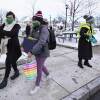Updated at 4:31 p.m.
With Boston's critical COVID-19 metrics trending downward, Mayor Michelle Wu said Tuesday that the city's proof of vaccination requirement could come to an end soon, before the multi-phase policy would apply to young children.
The policy, which Wu announced in December , requires those looking to enter most indoor recreation spaces — such as gyms, restaurants, theaters and museums — to provide proof of COVID-19 vaccination. Tuesday marked the first day that city venues were required to ask for proof of full vaccination, rather than partial. The mandate, so far, has only applied to people aged 12 and up. It was scheduled to phase in children ages 5 to 11 beginning in March.
At a press conference announcing state funding for a trio of city development projects, Wu said Boston's metrics might trigger the end of the vaccination proof requirement within the next several days.
"If the numbers continue along the trends that we're seeing, we could see this policy lifted in the next few days or so," Wu said when asked what would happen to the latter half of the policy targeted to vaccine-eligible children.
"We will cross that bridge if we come to it," she continued, "but [we are] urging everyone to continue the progress, continue following protections and making sure that we are encouraging all of our family and friends to get vaccinated, because we're seeing very good progress in terms of the metrics here."
More Politics
Wu's words came as Washington, D.C., ended a similar policy.
Even though leaders of Boston’s neighboring cities expressed support for Wu's mandate, she was largely alone in instituting strict vaccination policies.
Aside from requiring proof of vaccination to access indoor venues, Wu also instituted a vaccination requirement for Boston's city workforce of about 19,000 employees — a policy that has been met with lawsuits and protests from a small portion of the municipal workforce. Ninety-four percent of the city's workforce has complied with the policy and is vaccinated, Wu has said.
That aspect of the vaccination policy had been paused by legal challenge. On Tuesday, however, a state appeals court threw out a ruling that upheld Boston's vaccine mandate. The bottom line: municipal employee unions won the latest round.
Wu announced last week that Boston would relax the proof of vaccination mandate if three key metrics — the seven-day averages for hospitalizations, community positivity rate and ICU capacity — dipped below levels that her administration determined were acceptable.
Those set goals are:
- Less than 5 percent community positivity rate
- Less than 200 daily COVID-19 patients hospitalized
- Less than 95 percent ICU capacity
On Tuesday, the mayor said those key data points stand at 5.4 percent positivity, 278 COVID-19 hospitalizations per day and 90 percent ICU capacity.
Those numbers vary slightly from the data currently available on the Boston Public Health Commission's dashboard , which has crashed several times in the last few weeks.
Wu added that vaccinations for eligible children would remain a "big focus" of the city's health commission, including vaccination clinics for children during school vacation week.
This story was updated to reflect a state appeals court ruling on the city's employee vaccine mandate.








